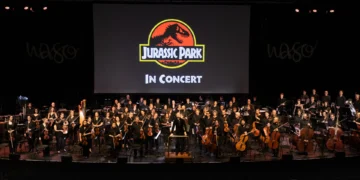Middle-earth is a realm that has captivated audiences for decades, and The Lord of the Rings: The War of the Rohirrim arrives with high expectations as an anime prequel to Peter Jackson’s iconic adaptations. Directed by Kenji Kamiyama, the film seeks to expand Tolkien’s mythos with a tale centered on Rohan’s storied history. While it boasts moments of visual splendor and compelling performances, it ultimately struggles to transcend its origins as a corporate product, leaving a mixed impression.
Set two centuries before Frodo’s journey, the film recounts the rise and fall of Helm Hammerhand, King of Rohan, and the legendary siege that gave Helm’s Deep its name. Narrated by Miranda Otto as Éowyn, the story opens with Helm (voiced by Brian Cox) embroiled in a conflict with Lord Freka, a rival leader with ties to the Dunlendings. The escalating tensions, sparked by a rejected marriage proposal between Freka’s son Wulf and Helm’s daughter Héra, spiral into a brutal war that tests Rohan’s resolve. While the story ostensibly centers on Helm, the narrative shifts its focus to Héra (Gaia Wise), casting her as a spirited heroine determined to carve her own path in a patriarchal society.

Visually, the film oscillates between stunning and inconsistent. Kamiyama’s anime style offers a refreshing take on Middle-earth, with dynamic battle sequences and striking landscapes that evoke the grandeur of the realm. One standout moment features Héra bonding with a giant eagle in a breathtaking, near-wordless sequence that captures her connection to nature and foreshadows her resilience. However, the animation falters in quieter moments, where static character expressions clash with the intensity of the dialogue, breaking immersion and diminishing emotional resonance.
Héra’s character brings a welcome feminist perspective to Tolkien’s lore, echoing the bravery and independence of her descendant Éowyn. Yet, the film’s attempts to develop her character are uneven. While she shines in scenes of defiance and action — such as her thrilling battle against an oliphant — these moments are undermined by abrupt shifts in the narrative. Her capture shortly after a display of competence feels jarring, as does the lack of depth afforded to her relationships with her family and enemies.

Brian Cox delivers a commanding performance as Helm, imbuing the character with a mix of gruff authority and vulnerability. His portrayal of Helm’s regret over his fatal blow to Freka adds layers to an otherwise straightforward character. The supporting cast, however, struggles to leave a lasting impression, with Wulf (Luke Pasqualino) reduced to a caricature of villainy and Freka’s role as a complex antagonist largely diminished.
The film’s narrative simplifies the morally ambiguous source material, turning what was a tragic tale of hubris and prejudice into a more conventional good-versus-evil story. By doing so, it sacrifices much of the thematic richness that defines Tolkien’s world. The absence of the moral complexities that shaped Helm Hammerhand’s legend results in a story that feels hollow, even as it attempts to inject gravitas through its epic battles and dramatic confrontations.

Despite its shortcomings, The War of the Rohirrim avoids leaning too heavily on franchise nostalgia, with minimal callbacks to The Lord of the Rings. However, moments of fan service — such as a forced reference to Mordor’s obsession with rings — serve as unwelcome reminders of its corporate motivations.
In the end, The Lord of the Rings: The War of the Rohirrim is a visually ambitious but narratively underwhelming addition to Middle-earth. While it offers glimpses of what could have been — a unique, anime-infused reimagining of Tolkien’s world — it ultimately feels like a missed opportunity. Fans of the franchise may find enjoyment in its action sequences and artistic flourishes, but it falls short of the epic, emotionally resonant storytelling that defines the best adaptations of Tolkien’s works.

TL;DR Review
The Lord of the Rings: The War of the Rohirrim
LOTR: The War of the Rohirrim delivers stunning visuals and anime-inspired artistry but falters with a lackluster narrative and occasional forced fan service. While it offers entertaining action and creative flair, it misses the mark on the emotional depth and epic, emotionally resonant storytelling Tolkien fans expect.
Review Breakdown
-
Unruly Rating

























































